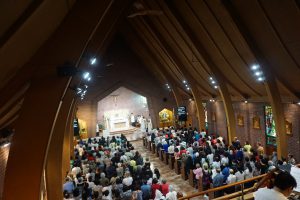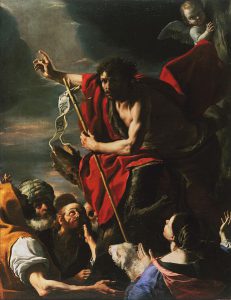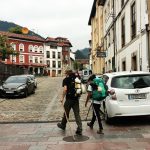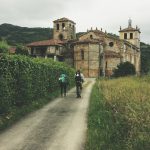In Rome I once met a newly married couple who were visiting from Vancouver. They were clearly in love—it was very sweet. Over lunch I asked how they met. The husband told me about their dating, and then about his long period of hesitation. However, during a confession, a priest asked him, “Well, are you going to marry her or what?” And he thought, “Yeah, what am I waiting for? This is an amazing woman. If I don’t do this now, some other guy will get her!”
[Listen to Fr. Justin’s homily here.]
[Part 1]
[Part 2]
 Decisions make or break a day. Today was shaped, in large part, by our decisions. We’re having a good day because we decided, by God’s grace, to choose what He wanted. Maybe we’re having a bad day—what good decisions did we fail to make? Our lives this week will be determined by the right decisions we make.
Decisions make or break a day. Today was shaped, in large part, by our decisions. We’re having a good day because we decided, by God’s grace, to choose what He wanted. Maybe we’re having a bad day—what good decisions did we fail to make? Our lives this week will be determined by the right decisions we make.
All of us hesitate in making difficult decisions. We put off taking care of our health, or confronting people. We struggle deciding on jobs, careers, or moving. We hesitate to commit to Jesus or try something spiritual.
I told you before about a friend of mine who challenged me to stop procrastinating and get my work done. I also told you about a young lady who, after hearing that I needed a new bed to take care of my back, asked me, “So when are you going to do it?” People who encourage us to make good decisions rather than endlessly waiting, are our friends.
Jesus is our best friend. He says today, “I came to bring fire to the earth, and how I wish it were already kindled! I have a baptism with which to be baptized, and what stress I am under until it is completed!” (Lk 12:49-50).
 Jesus came to bring fire to the earth. Fire in the Bible has multiple meanings, but let’s look at just one: It’s a symbol of the Holy Spirit, Who under the form of flames of fire, came upon the disciples at Pentecost, 50 days after Jesus’ Resurrection. Like fire, the Holy Spirit gives light, warmth, and burns. Jesus says He wishes the fire were already kindled, meaning He’s eager to destroy evil, purify us, give us the Holy Spirit, and “awaken within us the gift of faith” (Daniel Mueggenborg, Come Follow Me, Year C, 199-200).
Jesus came to bring fire to the earth. Fire in the Bible has multiple meanings, but let’s look at just one: It’s a symbol of the Holy Spirit, Who under the form of flames of fire, came upon the disciples at Pentecost, 50 days after Jesus’ Resurrection. Like fire, the Holy Spirit gives light, warmth, and burns. Jesus says He wishes the fire were already kindled, meaning He’s eager to destroy evil, purify us, give us the Holy Spirit, and “awaken within us the gift of faith” (Daniel Mueggenborg, Come Follow Me, Year C, 199-200).
And this means getting us to make decisions: Will we cooperate with Him? God respects human freedom, and waits for us to give Him permission to act in our lives. But He does want decisions. Why? Because love “seeks to become definitive” (Pope Benedict XVI, Deus Caritas Est, 6,2), which means that love grows when it becomes clear and permanent. When we fall in love with people, do we want to spend more time with them or less?
In one way, the fundamental message of Christianity is this: God has made a decision to love us eternally, to love each of us individually, and to bring us home into His family. But He waits for our decision to return.
Do you hear the intensity of love in Jesus’ words today? “How I wish it were already kindled!” St. Ambrose says that love has wings of fire that flies through the saints’ hearts (Ancient Christian Commentary on Scripture, Luke, 217), and it can’t wait forever.
 It’s similar to a couple’s dating: They get to know each other, discern God’s will, but eventually they have to make a decision. They can’t date forever. Another example is when you have a project or a mission, or are on a sports team, and you invite someone to join—eventually, you need a decision. Is that person in or out?
It’s similar to a couple’s dating: They get to know each other, discern God’s will, but eventually they have to make a decision. They can’t date forever. Another example is when you have a project or a mission, or are on a sports team, and you invite someone to join—eventually, you need a decision. Is that person in or out?
Jesus then says, “Do you think that I have come to bring peace to the earth? No, I tell you, but rather division! From now on five in one household will be divided, three against two and two against three” (Lk 12:51-52). Every decision means division. Every “Yes” means “No” to something else. A yes to our family means no to people outside our family. A yes to excellence means no to mediocrity. A yes to health means no to indulgence. A yes to Jesus means no to the lies and distractions of our culture. In the early Church, when people really chose to follow Jesus, it often meant their families would reject them.
When it comes to making a decision, keep in mind four principles:
1) Jesus never moves us to a decision faster than we can handle. In the Gospels, when He calls people to abandon everything, He prepared them for that. But, some of us are like Nicodemus, who came to Jesus at night (Jn 3:1-21), because he was afraid, and hadn’t yet made a decision. Jesus didn’t force him, but led him to make a decision, and Nicodemus eventually became a disciple: he was the one who brought the spices for Jesus’ burial (Jn 19:38).
2) The famous Christian pastor Andy Stanley once walked into a church staff meeting, put a blue piece of paper on the floor, and a green one across the room. Then he asked a woman to stand on the blue one and take a step towards the green without touching the floor. She couldn’t obviously. Why? Because it was too big of a step (Andy Stanley, Reggie Joiner & Lane Jones, 7 Practices of Effective Ministry, 93).
So take the next obvious simple step. Take away the paralysis of being overwhelmed, not knowing what will happen, and the fear of getting it wrong, with an easier step. Do you remember when Andrew and the other unnamed disciple started walking behind Jesus, after St. John the Baptist pointed Him out to them? It says, “The next day John again was standing with two of his disciples, and as he watched Jesus walk by, he exclaimed, ‘Look, here is the Lamb of God!’ The two disciples heard him say this, and they followed Jesus. When Jesus turned and saw them following, he said to them, ‘What are you looking for?’ They said to him, ‘Rabbi’ (which translated means Teacher), ‘where are you staying?’ He said to them…” (Jn 1:35-39). What did our Blessed Lord say? “Give up everything. Take up your cross.” No. “‘Come and see.’ They came and saw where he was staying, and they remained with him that day”(Jn 1:39). Our Lord is gentle, and invites us to the next simple step.
Tell someone spiritually mature about the decision you’re considering, someone who desires that you achieve your final end. Ask questions, get advice—those are the next steps.
3) A small decision forward is always better than no decision. It’s actually safer to start going in a direction and search for God’s will, rather than staying put. This doesn’t mean we don’t think things through and investigate—actually that’s part of moving forward. But, then go forward! Inaction is always a bad decision. By moving, we learn more about the decision and its consequences, and then God will redirect us if necessary.
4) Make decisions in time of spiritual consolation (Cf. 5th Rule in Rules for the Discernment of Spirits). St. Ignatius defines spiritual consolation this way: “When some interior movement is caused in the soul, through which the soul comes to be inflamed with love of its Creator and Lord… Every increase of hope, faith, and charity, and all interior joy that calls and attracts to heavenly things and to the salvation of one’s soul, quieting it and giving it peace in its Creator and Lord” (3rd Rule in Rules for the Discernment of Spirits)—make a decision in that state of soul and mind.
 For example, you know how many people leave a parish because someone hurt them? Lots. It’s understandable. Nevertheless, it’s still generally not good. Most made the decision when they were in a situation where they lacked forgiveness. Because they choose not to forgive, they’re far from God—spiritual desolation. The reality is, if they had talked to Jesus about it and allowed Him to help them heal and forgive, they would have chosen to stay, because they would have recognized that people at church hurt each other—that’s part of what families do! You know who’s stayed in this parish after being hurt? All of us. I’ve been hurt. You’ve been hurt. If you’re not yet hurt, you will be because St. Anthony’s is not a museum of saints but a hospital for sinners. We’ve chosen to stay because, in spite of the hurt, we grow here and help others grow.
For example, you know how many people leave a parish because someone hurt them? Lots. It’s understandable. Nevertheless, it’s still generally not good. Most made the decision when they were in a situation where they lacked forgiveness. Because they choose not to forgive, they’re far from God—spiritual desolation. The reality is, if they had talked to Jesus about it and allowed Him to help them heal and forgive, they would have chosen to stay, because they would have recognized that people at church hurt each other—that’s part of what families do! You know who’s stayed in this parish after being hurt? All of us. I’ve been hurt. You’ve been hurt. If you’re not yet hurt, you will be because St. Anthony’s is not a museum of saints but a hospital for sinners. We’ve chosen to stay because, in spite of the hurt, we grow here and help others grow.
Whenever we make a decision, we have to move first to a state of consolation! It’s not an emotional state of feeling good, but an awareness of the reality of God and His goodness, and we’re full of faith, hope, and love. In prayer, we realize the following: God is a loving, powerful God Who has this incredible plan, a plan from all eternity, for my good. He doesn’t allow bad things to happen to me without a reason. There’s so much for which to be grateful! Life and today are not perfect, but people love me. And I’m good, and can laugh at myself! I’ve got flaws, everyone’s got flaws, but God is good.
When aware of these truths, and we come to this awareness by praising Him, giving thanks to Him, and trusting Him, that’s when we should take the next good, moral step (Cf. Fr. Robert Spitzer, SJ, Five Pillars of the Spiritual Life, 147-158)!
All this is complex, so, when in doubt, talk to spiritually mature persons!
Pope St. John Paul II once said, “Listen to your heart! Do not stay on the surface, but go to the heart of things!… The Lord is waiting for you to put your freedom in his good hands.” Jesus has made a decision towards us, and now waits for us to make a decision towards Him.
And now, as we bid farewell to our summer seminarian, Raffaele, I’ve asked him to share a part of his vocation testimony, especially with regard to making decisions.
Many of you might be thinking, “OK, we get it, goody-two-shoes seminarian here is gonna tell us how he follows God so well and always knew he wanted to be a priest” — At least that’s what I would’ve thought… But it wasn’t until my 20s when I even considered the possibility of priesthood, and for a time before that I had lived the party lifestyle apart from the Church. Now looking back over 8 years, I’ve experienced a life-changing encounter with Christ, a direction-changing call to the priesthood, and an interior-changing invitation to spiritual growth — all major decisions with major changes setting my life on a completely different trajectory. But you know what? God led me through these major changes through the simplest means: He has only ever invited me to simply take the next right step. And when we discover that the journey to holiness is taken simply one step at a time, well, isn’t that something we can all do?
To be honest with you, entering seminary–which can feel like a combination of moving away from home, entering a serious dating relationship, and doing military boot camp, all at once–wasn’t the biggest decision I made because God had prepared me over the years with smaller steps leading up to it: first the choice to live for God and to do His will, then the choice to go on a mission trip, then the choice to get rid of sinful habits.
I learned the value of simply taking the next step the summer before entering seminary, when some friends and I did the Camino de Santiago. It’s an 800+ kilometre medieval pilgrimage across Spain ending at the Tomb of the Apostle James [i.e. Santiago]. If I had known what the trip would demand of me, I’d have opted for Mexico or Hawaii. But, naturally, we only took the Camino day by day, accepting the next ‘right step.’ Some days were awful, like walking along highways in rainstorms followed by hostels with cold showers. Other days were great, like when we’d stumble upon a secluded beach and have our lunch far out on the sand–until the tide suddenly comes in and picnic becomes panic instantaneously.
The Camino was above all an opportunity to trust God with every single decision: When the trail would fork in the mountains and our map was wrong, I had to make a choice to do the next right thing. Sometimes my decision was wrong: I thought my friends went left but after hours climbing a small mountain trail alone, realized they went right. Sometimes my decision needed immediate action: there’s a really angry goat about to block the path so either I run past now or square up for a fight.
The Camino taught me that it was far better to trust God and make a decision–even a small one–than to fear being wrong and just wait. I soon discovered that life is not only easier when lived as a series of smaller decisions; it’s more enjoyable as well! Yeah, you’ll make mistakes, but you’re growing! Now I know that the next time I’m dehydrated, don’t buy that Spanish grape soda because it’s actually cheap sangria.
When I entered seminary, it was a risky decision: It’s a risk because up to the night of your ordination God can reveal this is not your vocation, and you ‘start over’ from where you were 6 years earlier. But it’s also a risk where you can discover a life of intimacy with God and deep fulfillment you never would have known otherwise.
God has ordered each of our lives with numerous small decisions. Each decision leads us one step closer to Him or further from Him. But each decision is an opportunity to trust, and where there’s trust, there’s relationship. If you are paralyzed by the need to make a decision, either because you don’t know what the best one is or you fear the risk, then look to the One Who can be trusted. The prophet Jeremiah says “Blessed is the man who trusts in the LORD…He is like a tree planted by water, that sends out its roots by the stream and does not fear when heat comes; for its leaves remain green, is not anxious in the year of drought, and does not cease to bear fruit” (Jeremiah 17:7-8).





